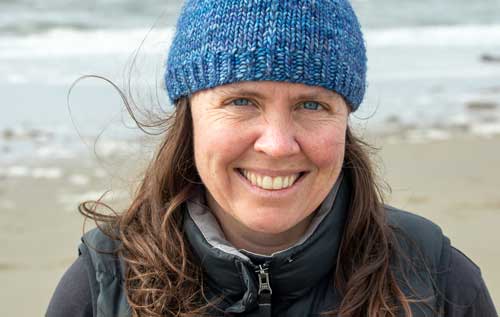I’ve heard a lot this week–from clients, friends, the media–about the IPCC (Intergovernmental Panel on Climate Change) report released on the 9th. The report clearly names the human influence on climate, the current impact of climate change, and the narrowing window of time we have to mitigate the impacts before ecological systems collapse beyond the possibility of repair.
I’m glad the report itself is receiving a lot of attention. However, our way of reporting and consuming that information can so easily push the automatic responses of our nervous systems into a state of shut down and inaction. Start with a common headline these days. You’ve probably seen something along the lines of, “Code red for humanity!” (The header image on this post is deliberately unrelated to code red. If you need a break from this topic while reading, scroll up to immerse yourself in the water view. Then come back.)
Still here? Great. Let’s try an experiment, just to see what impact headlines like this may have on your nervous system. What does the phrase, ‘code red for humanity’ do to your body and mind? Really, check in with yourself. I’ll give you a little empty space to do so.
What did you notice? I notice my chest tightening, my jaw constricting, and my heart rate increasing. My body wants to move and I feel a shakiness in my hands and legs. Just from that headline. And that’s okay. My nervous system in engaging in a threat response and climate change is absolutely a threat worthy of response. But what happens when I keep reading past the headline? (I encourage you to try this for yourself. Just google ‘code red for humanity’ and read any of the articles from any of your preferred sources. I’ll give you a little more empty space to play with this. But please come back here when you’re done, even if it feels like you don’t have the energy.)
When I read past the headline, I see more dire statistics and I notice the energy start draining from my body. After several more paragraphs of devastating information there is a sluggishness, heaviness, and weight that, if I were to pay attention to it, I could probably name as any number of strong emotions–despair, grief, exhaustion, even hopelessness. But I’m probably not going to pay attention to it enough because it’s too damn heavy for my one nervous system all by itself in front of a computer screen to manage. Instead, I’ll find a way to distract my brain and body and consign ‘code red for humanity’ to some deep, dark corner where I can barely make out that red warning light.
Often these articles have a final line or paragraph along the lines of, ‘But there’s still time!” At that point, though, my nervous system scoffs at such reassurance. Too little, too late. Even if my rational brain knows this is true, my nervous system by this point is too overwhelmed and trapped in threat response to make anything out of it.
I can’t fault myself, my body, or my brain for any of this. It’s how nervous systems work. We will respond to a threat with some sort of fight/flight energy. If the threat feels impossible to address with this sort of energy, our autonomic nervous system will sink further, into freeze. It’s a protective and adaptive response. (Think of a possum ‘playing’ dead when it can no longer run.) Climate change is a really, really, really big threat. Maybe the biggest threat possible. So no wonder it’s easy to be shut down, or hopeless, or despairing, or all sort of other things that keep us stuck and overwhelmed when we see this kind of news.
What’s the alternative?
I want climate change to be a constant and focused topic. We need to pay profound attention to this topic. But I wonder if more news and reporting based in the current model simply reinforces our tendency towards shut down and disengagement. Let’s start including genuine, meaningful resources for response and regulation in climate change reporting. I don’t mean just things like ‘here’s a place to donate to fight climate change’ (although by all means include that and do that, if you are able). I mean things like education around nervous system regulation and resources specific to ecological grief/anxiety. That way, instead of sinking into despair or distraction after reading such news, we can stay regulated enough to engage with ourselves and the threat at hand.
Good news–many such resources already exist!!!
Rather than recreate a resource list, I am gratefully going to link to other people’s excellent resource lists. I really like these options from Gen Dread and the All We Can Save Project. More great resources come from Climate and Mind. There is some overlap (resources in this realm are not so abundant yet that there is not plenty of cross-referencing.) But on both these lists are options from free to pricey and everything in between. There are group and individual ways to engage. Tons of books, podcasts, and articles. And all sorts of ways to connect with like-minded and like-feeling folks. (What’s one of the best ways to regulate a nervous system? Connection!!!) A couple additional resources I like are:
- For quick, body based exercises to help regulate when reading the news or at other times the emotional weight of these topics threaten to shut you down, Good Grief Network has some short guided videos for this purpose (scroll to the bottom of the page). While you’re there, check out the Good Grief Network’s other fantastic resources.
- For those ready to invest a little more time in being with these difficult emotions, there is a new, free, online training based on Joanna Macy’s book Active Hope. The Active Hope online training is designed to “nourish and strengthen your response to world problems, so that you’re better able to make a difference in the world.”
Curious about more personalized support for climate related emotions?
Ecological grief and anxiety are immense, weighty experiences. I grapple with them myself and support others in doing so. I know that we need multiple ways, practices, and communities to support the weight of it all. One to one therapy is one component that can be really helpful. Both of the lists mentioned above provide links to climate aware therapist directories. If you’re in Maine, I’d be glad to help with this piece. Therapy is not going to solve climate change. But it can you support you in being more able to stay regulated and present as your full self. I love this paragraph from Britt Wray at the end of the Gen Dread Resource list…
“Whatever path you choose to engage with climate emotions — one of the above or something else entirely — remember that feeling our feelings is part of climate work. To have our eyes wide open to both destruction and possibility takes courage. May we be fueled by ferocious love for all we can save.”
I am 100% behind that statement, and honored to work alongside courageous people finding their fuel in ferocious love.


